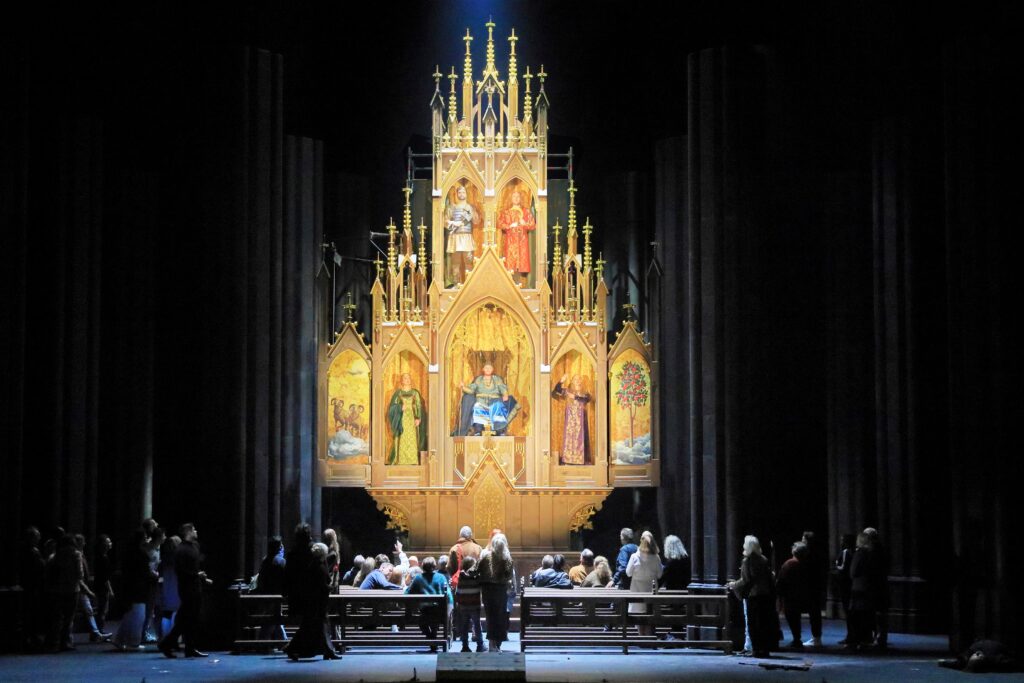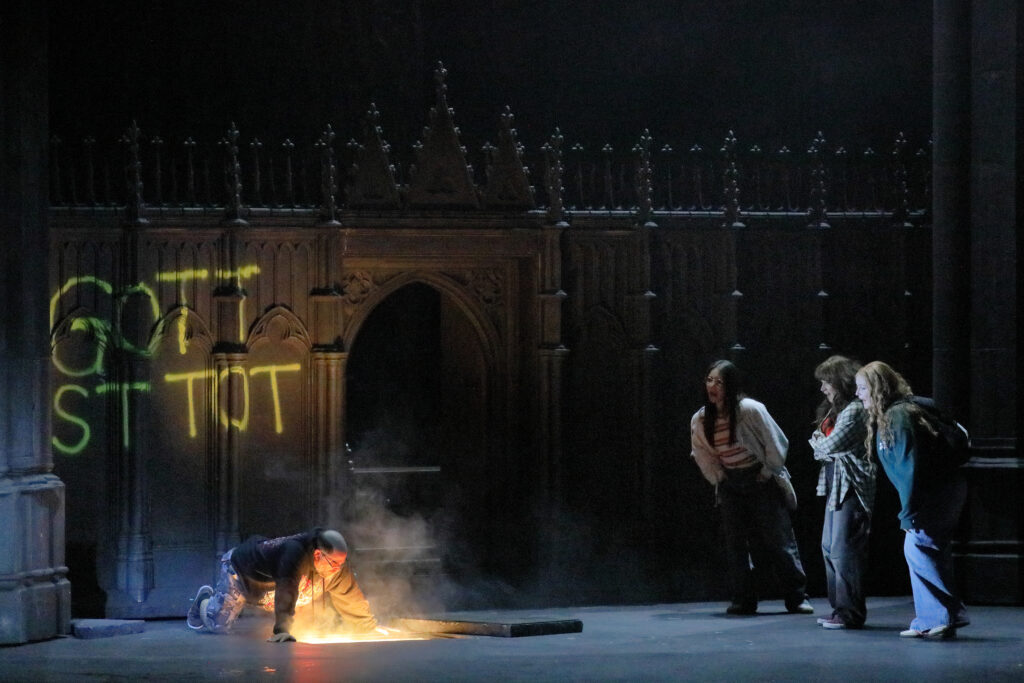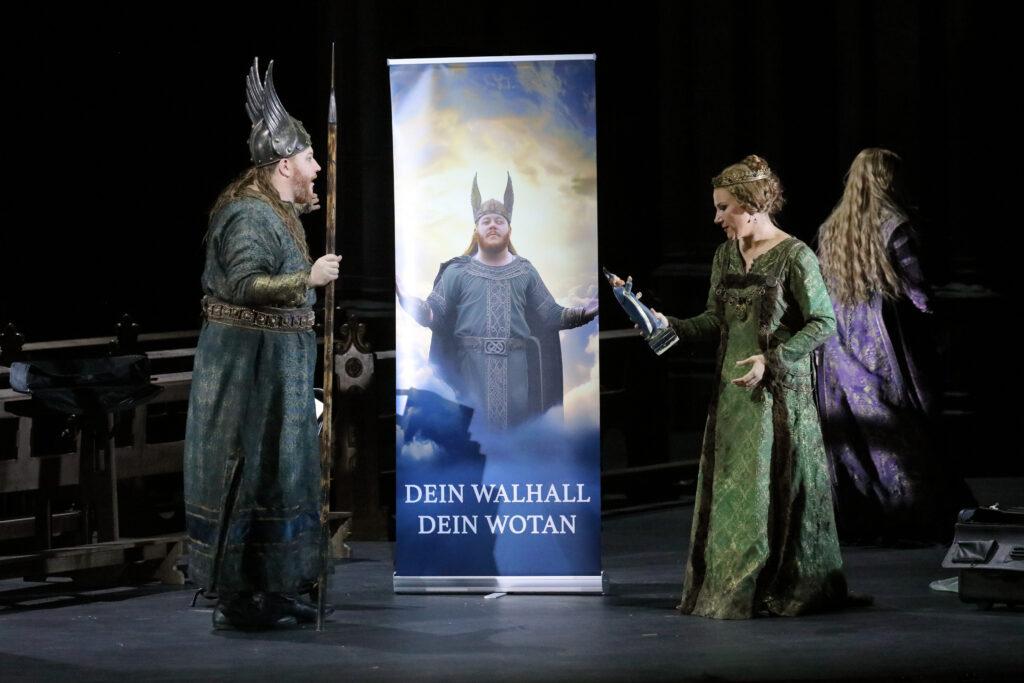The restored power of the gods: Tobias Kratzer has Wagner’s ‘Rheingold’ set in a church in Munich and lies in wait for the rebellion of the mortals.
Who would have thought that God, the gods, would have found refuge somewhere in a church after all? On foam mats and hidden in the pews, but at least they still exist. At least in Tobias Kratzer’s latest production of ‘Rheingold’ as the prelude to his ‘Ring’ cycle at the Munich State Opera, which is set in a high-ceilinged Gothic church. And these immortals seem to be enjoying a new lease of life, whether it’s due to Trump’s evangelicals or the anti-enlightenment fundamentalism that is taking hold everywhere.

In Munich, at any rate, we see them once again very much in defence, with hammer and spear, and very power-conscious. At the end, Wotan pulls the tarpaulin from the main altar, which is apparently ‘in restauro’, and the gods take the places of God and his saints for the ceremonial entry into Valhalla. Only Loge, a chain-smoking atheist in a black jumper, thinks nothing of this carnival in winged helmets and brocade dress; he could also set the world on fire with the lighter he has at the ready, the congregation just stares.
But there are still three operas to go before this new ‘Twilight of the Gods’. It generally stands for the replacement of polytheism by monotheism, the Christian religion of understanding, which abolishes the illogical hierarchy of partial deities with the Almighty and points the way to charity and mindfulness with all-grace. Kratzer’s troupe of gods obviously has nothing to do with the Christian God; set designer Rainer Sellmaier only uses the architecture.
What is to become of Kratzer’s genuinely new approach of seeing a story of the desperate struggle of mortals against the immortals in the ‘Ring’ remains rather questionable after this evening. It’s all filled with big images and detailed characterisation, but is it really our concern? Isn’t the trend of the moment rather boundless hedonism, the conscious enjoyment of the moment while denying all responsibility for the future that climate change would demand? Motto: After me, the deluge!
Richard Wagner himself gave the gods unmistakably human traits, not least referring to Feuerbach’s thesis that religion is merely the projection of deeply human fears and desires. And of course Wotan is a sinful god, burdened with all the guilt of the civiliser and lawgiver who wants to tame, regulate and exploit nature.
Alberich is the nihilist in Kratzer’s work. His ‘God is dead’ is emblazoned even in the church, but like all deniers of God, he waits all the more for it to appear. He doesn’t pull the trigger on himself. Instead, the Rhinemaidens rush in and tamper with the lid to the crypt, where gold soon shines out at them. As with Bibi and Tina, one of them can do a bit of magic, but this obviously doesn’t help against Alberich, who shoots one of them and makes off with the treasure. In a typical nerd tinkerer’s suburban garage, he tinkers with weapons and jewellery, using a VR goggles helmet as a camouflage helmet.

However, Wotan’s return is not without a system. Fasolt and Fafner in black with priest collar have a mobile propaganda stand like the Jehovah’s Witnesses. They fall to their knees in worship of their god, but they also want payment for their Wotan statuettes and the advertising campaign. Kratzer shows his usual humour when he takes Wotan and Loge, God and Schalk, in the video by plane to Nerd-Town in the United States and makes the God and his Freia apple slices in the freshness box suspicious at the security check. Even more so when, after successfully defeating Alberich, a toad sits in it. The toad then becomes the naked Alberich in the church, who develops a curse-fuelled strength in this humiliation. And pees on the pillar.
It is not very convincing that the hoard is piled up under the feet of Freia, who is pulled up by the construction crane, until she can reach it, then arbitrarily cranked up further for the missing ring. Erda appears as a pious worshipper from the church, looks good, but isn’t she actually a far superior natural deity to Wotan? It’s also wrong that the Rhinemaidens are now shining their torches around the dark nave as if looking for the lost penny. They know who has the ring and what is threatening, Loge calls out to them.
It becomes clear that the pompous ascent to the altar has reached an apparent climax, the restoration is complete, which would also have to be considered politically. Wagner himself, the revolutionary, will tear down this system based on deception and the destruction of nature.
Vladimir Jurowski takes his time at the podium of the Bavarian State Orchestra to develop this conversation piece. The E-flat major murmur doesn’t really get going, and there are also intonation problems in the winds. But from then on it works. It adapts well to the melody of the words, doesn’t cover up any of the singers and gives them a good foundation when the vocal passages come, as in the Rhinemaidens at the beginning, the free peaks and Wotan’s entry into Valhalla. The clarity of the text is excellent.

Nicholas Brownlee has a splendid baritone as Wotan, full-bodied, soft and concise. Markus Brück characterises Alberich with a full, powerful bass-baritone that rises dramatically in the curse. Sean Panikkar sings Loge with a wonderfully supple tenor, yet remains precise in his diction. The basses of Matthew Rose and Timo Riihonen as Fasolt and Fafner are sonorous, while Ekaterina Gubanova sings a supple Fricka with strong articulation. And Wiebke Lehmkuhl interprets Erda’s primal warning with a full-bodied alto. When she invokes the ‘gloomy day’ that is dawning for the gods, Jurowski lets the orchestra shimmer in the background, as if the ‘Twilight of the Gods’ is already dawning. The Munich cast is excellent in all positions. Where the direction may lead will be at least exciting to see.